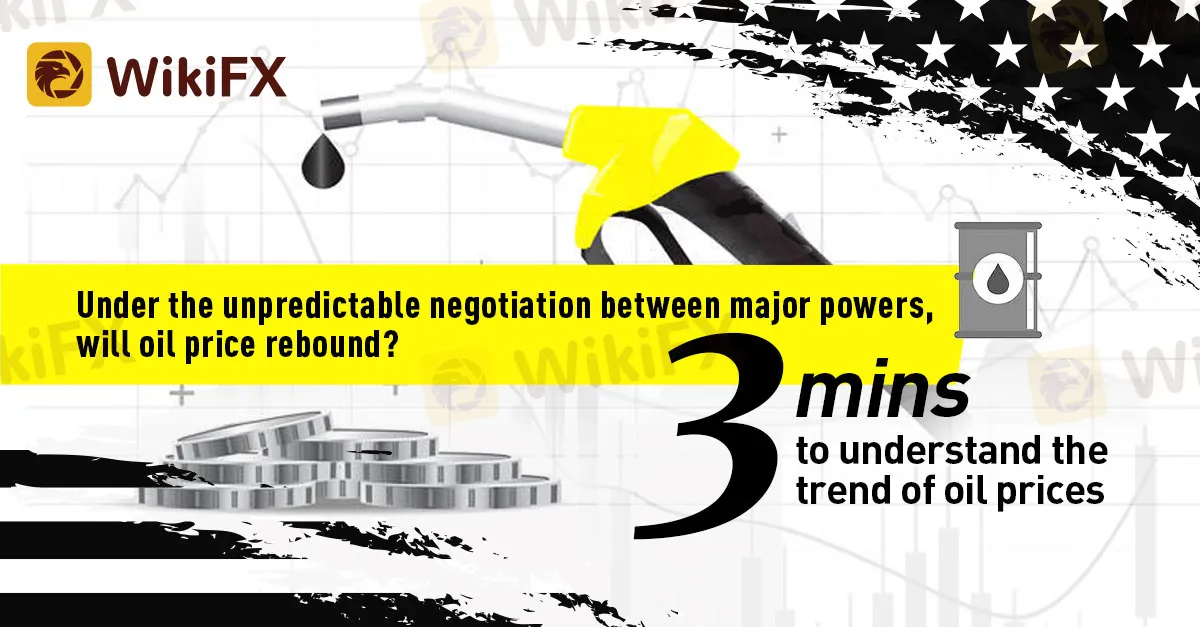简体中文
繁體中文
English
Pусский
日本語
ภาษาไทย
Tiếng Việt
Bahasa Indonesia
Español
हिन्दी
Filippiiniläinen
Français
Deutsch
Português
Türkçe
한국어
العربية
Will oil price rebound Under negotiation between powers? 3 mins to understand the trend of oil price
Abstract:The indirect cause of the avalanche of oil price is that coronavirus hits global oil demand, while the direct cause is the production reduction agreement between the OPEC and Russia has broken down, and both sides are no longer bound by the production restriction agreement.


Since the outbreak of the COVID-19 virus in late January 2020, global demand for crude oil and oil products has fallen sharply due to the pandemic, possibly by 3% or more. Under this situation, oil prices have plummeted. In the face of falling demand, Saudi Arabia tried to persuade OPEC to cut production by 1.5 million barrel/day, provided Russia followed suit. However, it was rejected by Russia. Companies in Russia did not want to miss out on cash flow and lose the market. After Russia refused to join the cut plan, Saudi Arabia announced over the weekend of March 7-8, 2020 that it would increase crude oil production and cut prices sharply.

Financial industry has suffered a heavy blow.In particular, both the ruble and the rial depreciated. Forex traders who bought those two currencies had suffered serious losses. Crude oil is a basic raw material for macro economy. The surplus of crude oil means that the economic development is in a declining trend.

Furthermore, falling oil prices will affect the economy through three main channels.
1: A fall in oil prices could widen credit spreads on US high-yield bonds and raise the risk of default. Also, the sharp fall in oil prices has led to forced liquidations and local liquidity risks. Moreover, the proportion of commodities allocated by financial institutions has fallen sharply, and the collapse in oil prices could trigger the spread of panic.
2: The falling oil prices could trigger deflation. The direct impact is to hold down the cost of petroleum consumer goods, and the indirect impact is to lower PPI and CPI by suppressing production costs.
3: The sharp fall in oil prices has led to the redistribution of global income. One result is that global income will be transferred from oil exporting countries to oil importing countries. The income of oil exporting countries will thus decrease, further leading to a decline of demand in importing countries and withdrawal of funds.
Looking ahead, there are three factors affecting oil prices which investors need to pay attention to.
1: The development of the global COVID-19 epidemic. If the epidemic could not be controlled on the global scale and continues for a long time, the oil producers could not get demand of oil from the supplies side and the demand side, which ultimately leads to a decline in global oil demand.
2: The negotiations between major oil-producing countries. Trapped by domestic political and economic pressure, Russia is unwilling to compromise on productions cuts and has declared that it can withstand oil prices at 25-30 dollars per barrel for 6-10 years. However, after negotiations broke down, the ruble immediately depreciated 9.5% against the US dollar. Therefore, the oil prices also depend on the attitudes of countries and how they weigh the economic pros and cons.
3: Attitudes of other oil-producing countries.
Saudi Arabia and Russia are in a tit-for-tat at this moment, while other oil-producing countries have also issued production expectations, which could trigger an oil price war if other major oil-producing countries join in.

The influence of oil slump in other industries.
1: Transportation:
Fuel costs account for 30% of airlines total cost. When the fuel costs are down, that is good for airline companies. But, according to the International Air Transport Association data: the airline industry could lose 63-113 million dollars due to the epidemic. There are many airline companies facing bankruptcy, so the oil demand declines sharply. The surplus of crude oil means that the economical development is trend to negative.
2: New energy industry.
At present, new energy is being developed all over the world. In order to find the alternative clean energy, the developed countries led by OECD pay more and more attention to energy efficiency. The fall in crude oil price will have a certain containment effect on the development of new energy.
3: Petrochemical industry.
The costs of petrochemical-related raw materials will go down, which is beneficial to producers of plastics, rubber, tires and so on in the downstream chemical industry chain.
Declaration:
The evidences in WikiFXs exposure articles are verified via the following processes:
1: Evidence Collection: (Chatting history records, Trading history records, Banking Transaction records and video recordings from victim).
2: These evidences will be evaluated and verified by experts who have been work in forex industry for many years.
3: The editor will review it again before the article is published.

WikiFX
App is a third-party inquiry platform for company profiles.WikiFX has
collected 17001 forex brokers and 30 regulators and recovered over
300,000,000.00 USD of the victims.
It, possessed by Wiki Co., LIMITED that was established in Hong
Kong Special Administrative Region of China, mainly provides basic
information inquiry, regulatory license inquiry, credit evaluation for
the listed brokers, platform identification and other services. At the
same time, Wiki has set up affiliated branches or offices in Hong Kong,
Australia, Indonesia, Vietnam, Thailand and Cyprus and has promoted
WikiFX to global users in more than 14 different languages, offering
them an opportunity to fully appreciate and enjoy the convenience
Chinese Internet technology brings. WikiFXs social media account as
below:
Facebook:
Singapore Area:https://www.facebook.com/wikifxsingapore/
USA Area:https://www.facebook.com/WikiFX.US
Nigeria Area:https://www.facebook.com/WikiFX.ng
LinkedIn:
Nigeria Area:https://www.linkedin.com/company/31506916
Twitter:
Nigeria Area:https://twitter.com/WikiFX_NG

Wiki Forum Forum Function:
In order to help more investors, WikiFX has launched the WikiFX
Forum forum, which aims to provide urgently needed and professional
services to Nigerian forex investors.
The exposure function of “WikiFX Forum” includes the following features:
1: Allow investors who have been defrauded by illegal broker to complain directly in the forum (as shown in the screenshots)
As long as there is sufficient evidence, a review panel and an
executive team will contact the broker to discuss the complaint or
expose it directly through the media. Here are the exposure channels:
2: Block low score brokers from entering the forum
3: Monitor suspicious communication in real time, and directly spot and deal with suspicious fraud;
4: Negotiate with highly reliable brokers selected by WikiFX in the secure environment of WikiFX Forum.
WikiFX APP exposure channel: https://activities.wikifx.com/gather/indexng.html
Information page to understand forex scam and exposure channel: https://activities.wikifx.com/gather/indexng.html
Website exposure channel: https://exposure.wikifx.com/ng_en/revelation.html
Worried about missing out latest trends in the volatile market? WikiFX ‘News Flash’ is here to help!

With
24-hour real-time update of forex market data by minute, you can seize
the opportunity of every bullish market! Bookmark the link below and
follow the market trends immediately!
Singapore Area:https://live.wikifx.com/sg_en/7x24.html
USA Area:https://live.wikifx.com/us_en/7x24.html
Nigeria Area:https://live.wikifx.com/ng_en/7x24.html
Disclaimer:
The views in this article only represent the author's personal views, and do not constitute investment advice on this platform. This platform does not guarantee the accuracy, completeness and timeliness of the information in the article, and will not be liable for any loss caused by the use of or reliance on the information in the article.
WikiFX Broker
Latest News
Two Californians Indicted for $22 Million Crypto and NFT Fraud
RM62k Lost Investment Scam After Joining XRP Community Malaysia on Telegram
Victims of Financial Fraud in France Suffer Annual Losses of at Least €500 Million
WikiFX Review: Is Ultima Markets Legit?
Colorado Duo Accused of $8M Investment Fraud Scheme
What Impact Does Japan’s Positive Output Gap Have on the Yen?
Macro Markets: Is It Worth Your Investment?
Trading is an Endless Journey
SEC Warns on Advance Fee Loan Scams in the Philippines
Malaysia Pioneers Zakat Payments with Cryptocurrencies
Currency Calculator


![[Video]1 min to understand the trend of oil prices under negotiation between powers](https://wzimg.ruiyin999.cn/guoji/2020-05-18/637254148326093965/ART637254148326093965_749862.jpg-article_list)
